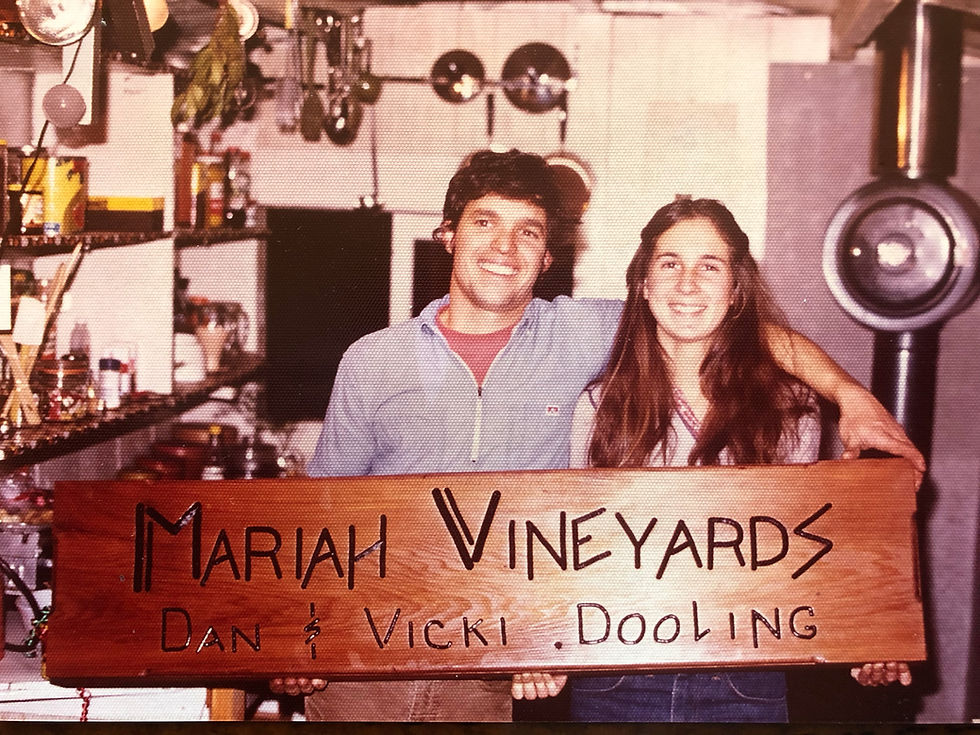WFCF Storybit : Mariah Vineyards
- Jason Franco

- Jan 30, 2020
- 4 min read
Updated: Oct 1, 2021

Let’s go where the hospitality is genuine, and the wine is aromatic. Jump in the car, take in the scenery, we are headed down the country roads to check out Mariah Vineyard. Let’s savor the fantastic taste of their many different grapes grown from sustainable farming practices. Their handcrafted wines are sure to leave you wanting more. From red berry fruit to vanilla spice they truly create a unique wine. Let’s find out how a dream became a reality.
The Story
Starting in 1975, Vicki and Dan Dooling searched for the perfect land to start a vineyard. This was prior to the popularity of vineyards and they wanted land outside of the mainstream vineyard areas. Dan was on the road during those days trucking throughout the 11 Western states for a company out of the San Francisco Bay area. Whenever he had a few days free, Vicki and Dan would look for potential vineyard land. Finally, they found exactly what they were looking for. The land was located on a mountain top in North West California in Mendocino County, which is 6 miles inland from the Pacific Ocean at 2,700-foot elevation. Dan had also showed the location to a close confidant of his from the local wine scene. He instantly thought that Dan had found a diamond in the rough. Now, Dan had to turn it into a shining jewel and that he did over the next 25 years. They bought that timbered ground in 1979, cleared it, worked the ground, and established an infrastructure which became Mariah Vineyards.

Dan and Vicki planted their first 20 acres of Zinfendel in 1980 and 1981. They did this all while living in a very small cabin with their two ranch dogs. Because they had no employees during those years, Vicki’s mom and dad would come up from San Francisco to help layout the vineyard and plant the grapes.
Now, let’s fast forward to the present. Today, they are in their 41st wine season and live by the philosophy of the Native Americans, “Walk softly on Mother Earth”. This has been their creed as stewards and farmers of the vineyard. Their calendar year starts in January when they start pruning the previous year’s growth off. This means about 90% of all canes are the cut off, chopped up, and reincorporated into the ground. They incorporate this with the cover crop of clover from the fall after harvest, then they tie up any arms that need tying and do any repairs to the stakes and trellis that support the vines. Spring cultivation and mowing is next with a few sprays of sulfur to clean up over wintering fungus or mildews.
One of the more important practices that they changed in the last 18 years is the switch to ‘dry farming.” During that timeframe, they did experience a loss in acres and grapes, but one thing did stick out, the flavor profile. So, in 1991 they started their own bonded winery and brand, Mariah Wines. In doing so, they diverted about 2% of the grapes to their own small commercial winery. This gave them diversification in their farming operation regardless of the size.

This means they do not irrigate during summertime. Instead, they rely on the rain they receive in the winter, which is usually between 80 to 120 inches of rainfall. With high organic content in the soil 9%-13% of the moisture holding capacity of the soil will get them through the growing season. They are not just farmers; they are winemakers and artists in their industry. Their pace maybe unhurried, but the flavors are worth the wait.
Verification Programs
Mariah Vineyards has been tied to the California Sustainable Winegrowers Alliance (CSWA) for years and have seen the benefits from their guidance and verification. They are currently in the process of upping their game even more in the near future. This allows Mariah Vineyard to be more in tune with their family heritage of farming ideals. They elected to get involved with CSWA programs because it fit the way they’ve done business dating back to 1981.

Why Verify
Dan and Vicki are both supporters of the verification process because they have experienced the benefits and believe verification helps show credibility and honesty in the relationship between winegrower and customer. This gives their customers assurance when selecting their wine and grapes. Understanding the story of your product is important and with so many different brands and types it’s important to be transparent. They rely and cherish the relationship they have created with their customers. If you enjoy reading about where your food comes from, Dan wants you to know it’s all about working hard with family and nature to produce an honest healthy product that you enjoy consuming. Wine and a good meal, the perfect combo!
Where Can You Find Mariah Wines?
Some of the wineries that buy Mariah grapes for their wines are:
Donkey & Goat – Berkeley, Cali.
Waist-Mast Wines – San Francisco, Cali.
Dogwood and Thistle – Napa, Cali.
Newton Wines – St.Helena, Napa Valley, Cali.
Seghesio Wines – Healdsburg, Cali.
LaRochell – Kenwood, Cali.
Wooden Head Wines – Healdsburg, Cali.
1211Wines – San Francisco, Cali.
Rockwall Wines- Alameda, Cali.
Red Car Wines – Sebastopol, Cali.
Bee Hunter – Boonville, Cali.,
and their own winery Mariah Wines, Manchester, Cali.
Today they grow many different grape varieties – Old Vine Zinfandel, Sauvignon Blanc, Chardonnay, 4 varieties of Pinot Noir, and Primotivo; all of which are dry farmed.
Dan would like to share and give credit to the vineyards, that as stewards of the land they farm, which he says is best done by an old wine god saying








